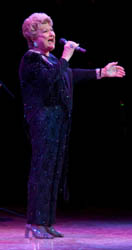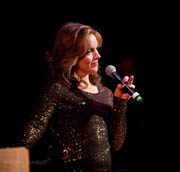
Paulanne Simmons
Town Hall’s “Broadway By the Year” Reviews 1946
The Broadway Musicals of 1946 1946 was a headline year for many reasons. It was the year Winston Churchill first warned of the danger of the “Iron Curtain” falling over Eastern Europe. It was the year the Nuremberg court delivered death sentences to a dozen Nazis. It was the year Tide, Benjamin Spock’s “Baby and Child Care” and the bikini first appeared. Most important, it was the year American soldiers, returned from World War II, created the Baby Boomer generation. However, 1946 was not a tremendously successful year for Broadway musicals, with one most notable exception, Irving Berlin’s “Annie Get Your Gun.” So it should not be surprising that Town Hall’s inaugural show in this year’s Broadway By the Year concert series, The Broadway Musical’s of 1946, leans heavily on Berlin’s masterpiece.
Fortunately, Tom Wopat, who played Frank in the 1999 Broadway revival, was on hand to display his talents with “My Defenses Are Down,” “They Say It’s Wonderful” (with Alice Ripley) and “Anything You Can Do” (with Jessie Mueller). While the venerable cabaret and theater virtuoso, Marilyn Maye chimed in with “I Got Lost in His Arms.” And of course “Annie Get Your Gun” provides a wonderful opening and closing ensemble number, that quintessential tribute to theater, “There’s No Business Like Show Business.” But as Scott Siegel, who creates, writes and hosts all the shows in the series stated, there were many other musicals in 1946 that may not have been big hits but still introduced beautiful songs that have since become standards. Most notable is “St. Louis Woman,” which was based on the novel “God Sends Sunday” by African-American writer Arna Bontemps and has music by Harold Arlen and lyrics by Johnny Mercer. It ran for only 113 performances at the Martin Beck Theatre and was plagued with difficulties, most prominently when when the N.A.A.C.P. criticized the musical for "offering roles that detract from the dignity of our race" and Lena Horne, agreeing with this assessment, refused to star in the show because she had no intention of portraying "a flashy lady of easy virtue.” Nevertheless the show has left us with “Come Rain or Come Shine” and “Any Place I Hang My Hat Is Home,” both performed with charm and vivacity by Maye; and “A Woman’s Prerogative,” sung with a sexy sparkle by Dameka Hayes. Other musicals of the year include “Three to Make Ready” and “Call Me Mister,” the first providing choreographer Noah Racey with “The Old Soft Shoe,” and the second with “South America, Take It Away.” On second thought, even if 1946 didn’t produce many box office hits, it was still a very good year. |
| museums | NYTW mail | recordings | coupons | publications | classified |



